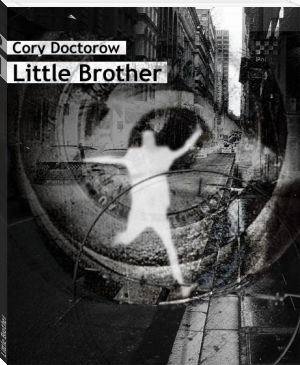Little Brother - Cory Doctorow (book recommendations website txt) 📗

- Author: Cory Doctorow
Book online «Little Brother - Cory Doctorow (book recommendations website txt) 📗». Author Cory Doctorow
"Gait" is a fancy word for the way you walk. People are pretty good at spotting gaits -- next time you're on a camping trip, check out the bobbing of the flashlight as a distant friend approaches you. Chances are you can identify him just from the movement of the light, the characteristic way it bobs up and down that tells our monkey brains that this is a person approaching us.
Gait recognition software takes pictures of your motion, tries to isolate you in the pics as a silhouette, and then tries to match the silhouette to a database to see if it knows who you are. It's a biometric identifier, like fingerprints or retina-scans, but it's got a lot more "collisions" than either of those. A biometric "collision" is when a measurement matches more than one person. Only you have your fingerprint, but you share your gait with plenty other people.
Not exactly, of course. Your personal, inch-by-inch walk is yours and yours alone. The problem is your inch-by-inch walk changes based on how tired you are, what the floor is made of, whether you pulled your ankle playing basketball, and whether you've changed your shoes lately. So the system kind of fuzzes-out your profile, looking for people who walk kind of like you.
There are a lot of people who walk kind of like you. What's more, it's easy not to walk kind of like you -- just take one shoe off. Of course, you'll always walk like you-with-one-shoe-off in that case, so the cameras will eventually figure out that it's still you. Which is why I prefer to inject a little randomness into my attacks on gait-recognition: I put a handful of gravel into each shoe. Cheap and effective, and no two steps are the same. Plus you get a great reflexology foot massage in the process (I kid. Reflexology is about as scientifically useful as gait-recognition).
The cameras used to set off an alert every time someone they didn't recognize stepped onto campus.
This did not
work.
The alarm went off every ten minutes. When the mailman came by. When a parent dropped in. When the grounds-people went to work fixing up the basketball court. When a student showed up wearing new shoes.
So now it just tries to keep track of who's where and when. If someone leaves by the school-gates during classes, their gait is checked to see if it kinda-sorta matches any student gait and if it does, whoop-whoop-whoop, ring the alarm!
Chavez High is ringed with gravel walkways. I like to keep a couple handsful of rocks in my shoulder-bag, just in case. I silently passed Darryl ten or fifteen pointy little bastards and we both loaded our shoes.
Class was about to finish up -- and I realized that I still hadn't checked the Harajuku Fun Madness site to see where the next clue was! I'd been a little hyper-focused on the escape, and hadn't bothered to figure out where we were escaping to
.
I turned to my SchoolBook and hit the keyboard. The web-browser we used was supplied with the machine. It was a locked-down spyware version of Internet Explorer, Microsoft's crashware turd that no one under the age of 40 used voluntarily.
I had a copy of Firefox on the USB drive built into my watch, but that wasn't enough -- the SchoolBook ran Windows Vista4Schools, an antique operating system designed to give school administrators the illusion that they controlled the programs their students could run.
But Vista4Schools is its own worst enemy. There are a lot of programs that Vista4Schools doesn't want you to be able to shut down -- keyloggers, censorware -- and these programs run in a special mode that makes them invisible to the system. You can't quit them because you can't even see they're there.
Any program whose name starts with $SYS$ is invisible to the operating system. it doesn't show up on listings of the hard drive, nor in the process monitor. So my copy of Firefox was called $SYS$Firefox -- and as I launched it, it became invisible to Windows, and so invisible to the network's snoopware.
Now I had an indie browser running, I needed an indie network connection. The school's network logged every click in and out of the system, which was bad news if you were planning on surfing over to the Harajuku Fun Madness site for some extra-curricular fun.
The answer is something ingenious called TOR -- The Onion Router. An onion router is an Internet site that takes requests for web-pages and passes them onto other onion routers, and on to other onion routers, until one of them finally decides to fetch the page and pass it back through the layers of the onion until it reaches you. The traffic to the onion-routers is encrypted, which means that the school can't see what you're asking for, and the layers of the onion don't know who they're working for. There are millions of nodes -- the program was set up by the US Office of Naval Research to help their people get around the censorware in countries like Syria and China, which means that it's perfectly designed for operating in the confines of an average American high school.
TOR works because the school has a finite blacklist of naughty addresses we aren't allowed to visit, and the addresses of the nodes change all the time -- no way could the school keep track of them all. Firefox and TOR together made me into the invisible man, impervious to Board of Ed snooping, free to check out the Harajuku FM site and see what was up.
There it was, a new clue. Like all Harajuku Fun Madness clues, it had a physical, online and mental component. The online component was a puzzle you had to solve, one that required you to research the answers to a bunch of obscure questions. This batch included a bunch of questions on the plots in dojinshi -- those are comic books drawn by fans of manga, Japanese comics. They can be as big as the official comics that inspire them, but they're a lot weirder, with crossover story-lines and sometimes really silly songs and action. Lots of love stories, of course. Everyone loves to see their favorite toons hook up.
I'd have to solve those riddles later, when I got home. They were easiest to solve with the whole team, downloading tons of dojinshi files and scouring them for answers to the puzzles.
I'd just finished scrap-booking all the clues when the bell rang and we began our escape. I surreptitiously slid the gravel down the side of my short boots -- ankle-high Blundstones from Australia, great for running and climbing, and the easy slip-on/slip-off laceless design makes them convenient at the never-ending metal-detectors that are everywhere now.
We also had to evade physical surveillance, of course, but that gets easier every time they add a new layer of physical snoopery -- all the bells and whistles lull our beloved faculty into a totally false sense of security. We surfed the crowd down the hallways, heading for my favorite side-exit. We were halfway along when Darryl hissed, "Crap! I forgot, I've got a library book in my bag."
"You're kidding me," I said, and hauled him into the next bathroom we passed. Library books are bad news. Every one of them has an arphid -- Radio Frequency ID tag -- glued into its binding, which makes it possible for the librarians to check out the books by waving them over a reader, and lets a library shelf tell you if any of the books on it are out of place.
But it also lets the school track where you are at all times. It was another of those legal loopholes: the courts wouldn't let the schools track us
with arphids, but they could track library books
, and use the school records to tell them who was likely to be carrying which library book.
I had a little Faraday pouch in my bag -- these are little wallets lined with a mesh of copper wires that effectively block radio energy, silencing arphids. But the pouches were made for neutralizing ID cards and toll-book transponders, not books like --
"Introduction to Physics?" I groaned. The book was the size of a dictionary.
CHAPTER 2
This chapter is dedicated to Amazon.com, the largest Internet bookseller in the world. Amazon is amazing
-- a "store" where you can get practically any book ever published (along with practically everything else, from laptops to cheese-graters), where they've elevated recommendations to a high art, where they allow customers to directly communicate with each other, where they are constantly invented new and better ways of connecting books with readers. Amazon has always treated me like gold -- the founder, Jeff Bezos, even posted a reader-review for my first novel! -- and I shop there like crazy (looking at my spreadsheets, it appears that I buy something from Amazon approximately every six days
). Amazon's in the process of reinventing what it means to be a bookstore in the twenty-first century and I can't think of a better group of people to be facing down that thorny set of problems.
[[Amazon: http://www.amazon.com/exec/obidos/ASIN/0765319853/downandoutint-20]]
"I'm thinking of majoring in physics when I go to Berkeley," Darryl said. His dad taught at the University of California at Berkeley, which meant he'd get free tuition when he went. And there'd never been any question in Darryl's household about whether he'd go.
"Fine, but couldn't you research it online?"
"My dad said I should read it. Besides, I didn't plan on committing any crimes today."
"Skipping school isn't a crime. It's an infraction. They're totally different."
"What are we going to do, Marcus?"
"Well, I can't hide it, so I'm going to have to nuke it." Killing arphids is a dark art. No merchant wants malicious customers going for a walk around the shop-floor and leaving behind a bunch of lobotomized merchandise that is missing its invisible bar-code, so the manufacturers have refused to implement a "kill signal" that you can radio to an arphid to get it to switch off. You can reprogram arphids with the right box, but I hate doing that to library books. It's not exactly tearing pages out of a book, but it's still bad, since a book with a reprogrammed arphid can't be shelved and can't be found. It just becomes a needle in a haystack.
That left me with only one option: nuking the thing. Literally. 30 seconds in a microwave will do in pretty much every arphid on the market. And because the arphid wouldn't answer at all when D checked it back in at the library, they'd just print a fresh one for it and recode it with the book's catalog info, and it would end up clean and neat back on its shelf.
All we needed was a microwave.
"Give it another two minutes and the teacher's lounge will be empty," I said.
Darryl grabbed his book at headed for the door. "Forget it, no way. I'm going to class."
I snagged his elbow and dragged him back. "Come on, D, easy now. It'll be fine."
"The teacher's lounge
? Maybe you weren't listening, Marcus. If I get busted just once more
, I am expelled.
You hear that? Expelled.
"
"You won't get caught," I said. The one place a teacher wouldn't be after this period was the lounge. "We'll go in the back way." The lounge had a little kitchenette off to one side, with its own entrance for teachers who just wanted to





Comments (0)